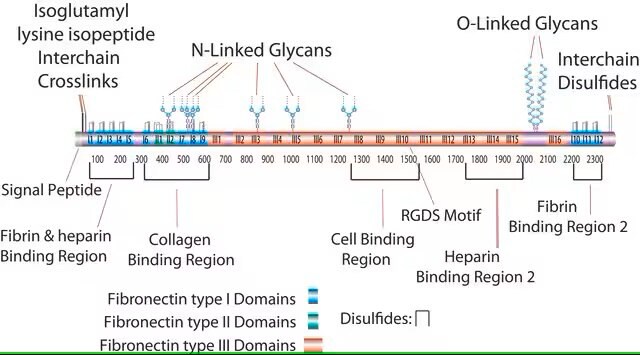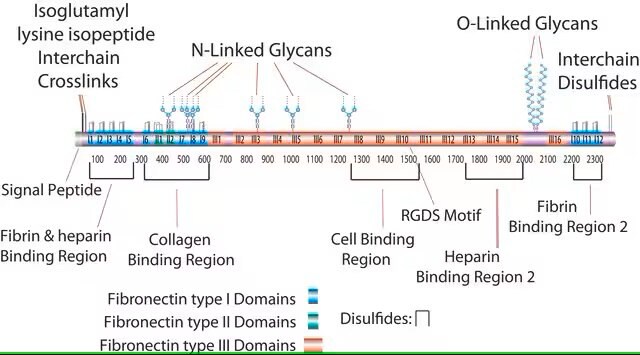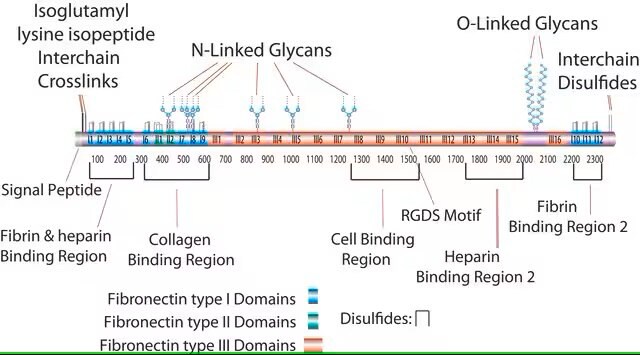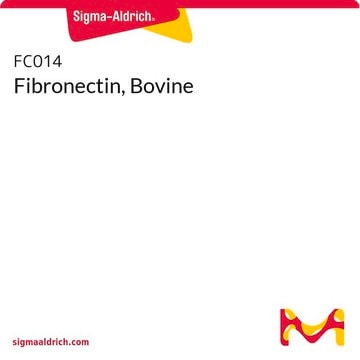F0895
Human Fibronectin
from human plasma, liquid, 1 mg/mL, suitable for cell culture
Synonym(s):
Fibronectin
About This Item
Recommended Products
product name
FIBRONECTIN FROM HUMAN PLASMA, liquid, 0.1% (Solution), BioReagent, suitable for cell culture
biological source
human plasma
Quality Level
sterility
sterile
product line
BioReagent
form
liquid
packaging
pkg of 1 mg
pkg of 2 mg
pkg of 5 mg
concentration
0.1% (Solution)
technique(s)
cell culture | mammalian: suitable
surface coverage
1‑5 μg/cm2
solubility
saline: 0.05 M (Tris-buffered)
UniProt accession no.
Binding Specificity
Peptide Source: Collagen
shipped in
wet ice
storage temp.
2-8°C
Gene Information
human ... FN1(2335)
Looking for similar products? Visit Product Comparison Guide
General description
FN occurs as a dimeric protein, linked by two disulfide bonds at the end of C-terminal. Within the fibronectin structure, the domains are compactly arranged close to both the amino and carboxyl terminal of the peptide chains. Moreover, it has been observed that despite arising from a single gene up to 20 distinct variants of this gene have been identified in humans.
Application
Biochem/physiol Actions
Features and Benefits
- Adhesive glycoprotein
- Derived from human plasma
- Recommended surface coverage of 1-5 μg/cm2
Preparation Note
In coating culture surfaces, fibronectin should be diluted in sterile balanced sterile salt solution and coated with minimal volume. Surface should then be air dried for 45 minutes at room temp and can be stored for 2-4 weeks at 2-8°C
Analysis Note
Legal Information
Disclaimer
related product
Storage Class Code
12 - Non Combustible Liquids
WGK
WGK 1
Flash Point(F)
Not applicable
Flash Point(C)
Not applicable
Certificates of Analysis (COA)
Search for Certificates of Analysis (COA) by entering the products Lot/Batch Number. Lot and Batch Numbers can be found on a product’s label following the words ‘Lot’ or ‘Batch’.
Already Own This Product?
Find documentation for the products that you have recently purchased in the Document Library.
Customers Also Viewed
Articles
Fibronectin (FN) plays crucial roles in extracellular matrix fibril assembly and cellular interactions.
Fibronectin (FN) plays crucial roles in extracellular matrix fibril assembly and cellular interactions.
Fibronectin (FN) plays crucial roles in extracellular matrix fibril assembly and cellular interactions.
Fibronectin (FN) plays crucial roles in extracellular matrix fibril assembly and cellular interactions.
Our team of scientists has experience in all areas of research including Life Science, Material Science, Chemical Synthesis, Chromatography, Analytical and many others.
Contact Technical Service










